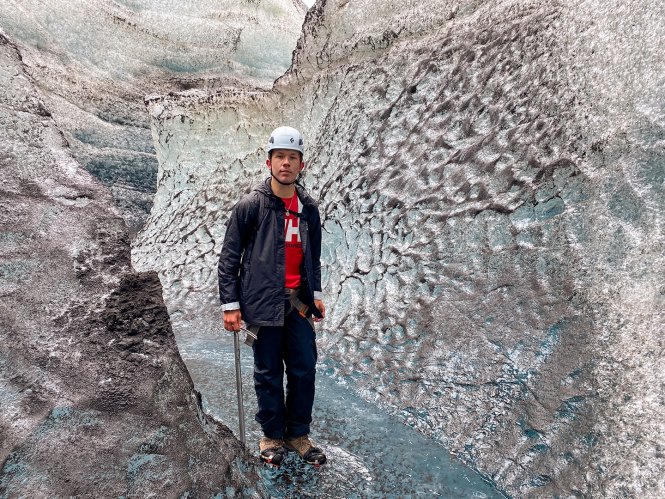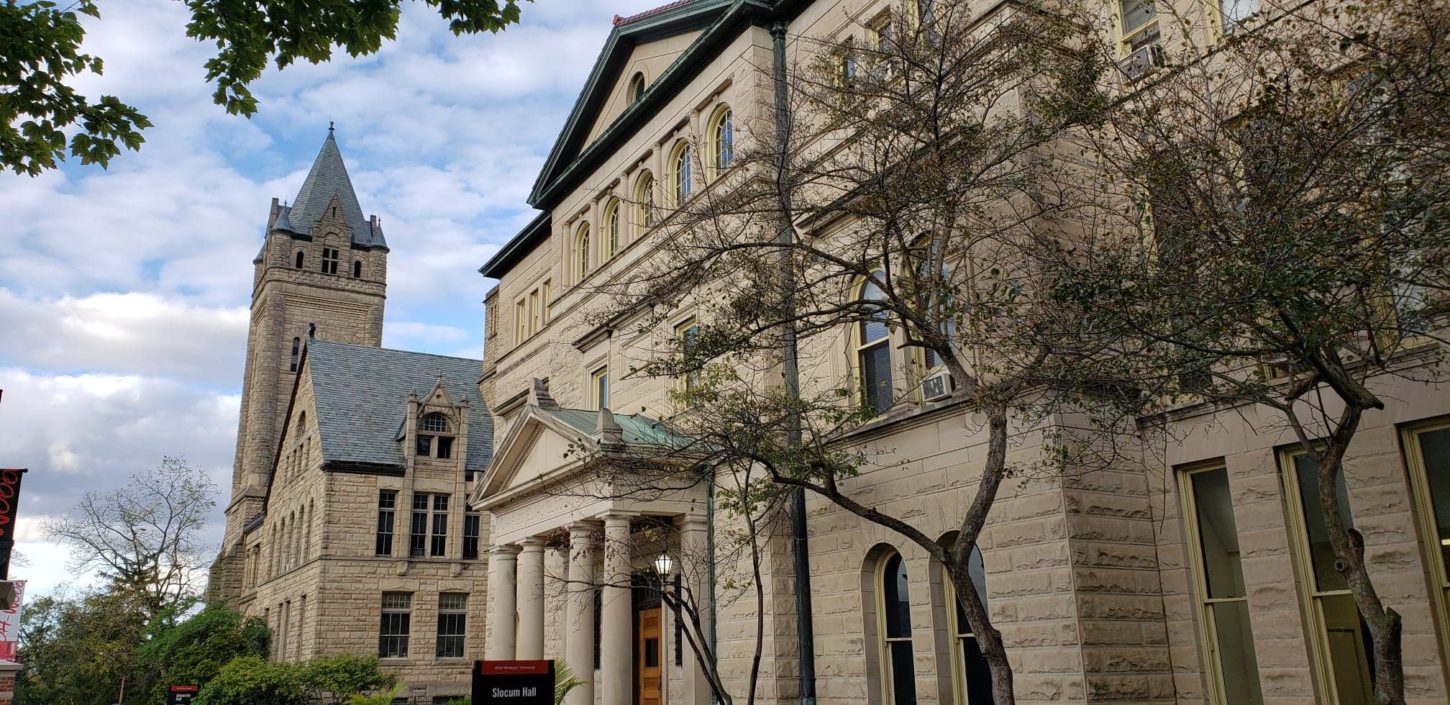Ohio Wesleyan University students will explore conservation and sustainable development in Peru, food allergy policy in the United Kingdom, the mental health effects of music in the Black community, and other topics using nearly $47,000 in newly awarded, university-funded Theory-to-Practice Grants.
The nine new TPG awards are part of Ohio Wesleyan’s signature program, The OWU Connection. The program is designed to help students think big (understand issues from multiple academic disciplines), go global (gain international perspective), and get real (translate classroom knowledge into real-world experience).
Previous grant recipient Elliot Spicer, a sophomore from Newark, Ohio, used his funds to visit Iceland for two weeks last semester to study the costs and benefits of ecotourism.
“After completing my Theory-to-Practice Grant experience, I can truly say that it has been the most rewarding experience of my life,” said Spicer, an Economics and Environmental Science double-major. “When starting the TPG proposal … the idea of actually being able to do this research seemed like a dream, and never could I have pictured that it would actually happen.”
Those earning fall 2021 Ohio Wesleyan Theory-to-Practice Grants and their upcoming projects include:
- “Conservation and Sustainable Development in the Oxapampa Cloud Forest,” submitted by Alena Arnold, a junior from Ashland, Ohio. Arnold plans to travel to South America to volunteer for four weeks to work on a conservation project in Oxapampa, a highly biodiverse and ecologically important area in Peru. Arnold is majoring in Environmental Science and Biology, and minoring in Sociology-Anthropology.
- “Returning to Sicily: Exploring 19th Century Historical Trauma in Valguarnera Caropepe,” submitted by Dmitri Ashakih, a senior from Norwalk, Ohio. Ashakih plans to travel to Italy for a week to interview historians, archivists, priests, government officials, and civilians in the Valguarnera Caropepe area of Sicily as well as visit historical sites to study the traumatic political and economic conditions that caused mass migration to the United States in the 1800s and 1900s. Ashakih also will research his family lineage with all of the information compiled into a work of creative nonfiction. Ashakih is majoring in English and Communication.
- “Reorienting Perspectives: Crimes of Women in Antiquity and American Law,” submitted by Hank Blume, Ph.D., visiting assistant professor of Classics. Blume will use the grant to enhance his “Women in Antiquity” course, enabling up to 33 students to hear the experiences of women accused of crimes that constitute cultural taboos and then making the public aware of the associated issues.
- “Collecting Histories: A Study of Authenticity, Immigration, and Imperialism in European Food Systems,” submitted by senior Acadia Caryl of Highland Heights, Ohio, with senior Leigh Stavar of Perry, Ohio. They plan to travel to the United Kingdom for a week to explore how British colonialism has impacted immigrant food corridors through the lens of perceived authenticity in the areas of London, Birmingham, and Oxford. Their research will include visiting food markets, vendors, restaurants, and diners to complete structured observations, smaller interviews, and oral histories. Caryl is an English-Literature and Psychology major, and an Environmental Studies minor. Stavar is a pre-medicine and nutrition major, and an English minor.
- “Caught in the Act: Using Trail Cameras to Investigate the Relationship Between Nest Microhabitat and Predation in the Desert Southwest,” submitted by junior Josie Fornara of Coshocton, Ohio, with sophomore Lily Hambric of Charleston, South Carolina. They will use their grant to investigate between March and mid-June whether different features of songbird nest-sites affect the likelihood of attack by specific desert predators. They will use trail cameras to study the Black-throated Sparrow nests at the Sevilleta National Wildlife Refuge in New Mexico. Their goal is to offer insight into how climate-driven changes in desert plant and predator communities may affect songbird nesting success. Fornara is a Pre-professional Zoology and Environmental Science major, and a chemistry minor. Hambric is a French major and a Psychology minor.
- “Workshop Intensive: Performing for New Plays,” submitted by Cortney McEniry Knipp, M.F.A., assistant professor of Performing Arts. Knipp’s project focuses on preparing student-actors to perform in a New Play Development Workshop, where the actors and directors support a playwright by rehearsing and performing a scripted work as it is under revision. Ohio Wesleyan will host a New Play Development Workshop with Kimberly Belflower and Megan Tabaque for their play “Teen Girl FANtasies.” The workshop will accommodate up to eight students, including the roles of stage manager and assistant director.
- “Changing Student Perceptions of Regulatory Policy: Studying Food Allergy Policy in the UK,” submitted by Franchesca Nestor, Ph.D., assistant professor of Politics and Government, with students Danielle Black, a senior from Proctorville, Ohio; Sarah Sewell-Conley, a senior from Sylvania, Ohio; and Mallorie Watts, a senior from Delaware, Ohio. They plan to travel to the United Kingdom for a week to pilot a concept that they hope becomes part of a future OWU Travel-Learning Course on food policy regulation. Black is a Politics and Government and Pre-Law major, and a History minor. Sewell-Conley is a Nutrition major. Watts is a Social Justice and Politics and Government major.
- “Conservation of the Macaw,” submitted by Zynnia Peterson, a junior from Mount Vernon, Ohio. Peterson plans to travel to Costa Rica for a month this summer to complete volunteer work to help conserve endangered Macaws. Peterson is a Zoology-General major and an Environmental Science minor.
- “SoulR Eclipse – A Study on the Effects of Music on Mental Health and Coping within the Black Community,” submitted by Xena Yarbrough, a senior from Providence, Rhode Island. Yarbrough will work through April to study the effects of music in the Black community, on the brain, the psychological responses it induces, and how music can and has been used for healing. As part of the study, Yarbrough will write and create an album discussing the varying experiences of growing up Black in America. The album then will be presented to a focus group of 20 students and ethnographic (cultural) data will be collected and analyzed. Yarbrough is a Psychology major.
After the students complete their OWU Connection experiences, they will prepare reports and presentations based on their objectives and experiences, with many presenting at the university’s annual Student Symposium in the spring.
In addition to Theory-to-Practice Grants, The OWU Connection includes Travel-Learning Courses, mentored research, internships, and more. Learn more at owu.edu/connection.
Photo: Ohio Wesleyan student Elliot Spicer used a university-funded Theory-to-Practice Grant to study ecotourism in Iceland. OWU just announced its latest round of TPG awards, part of its signature OWU Connection program. (Photo courtesy of Elliot Spicer)









